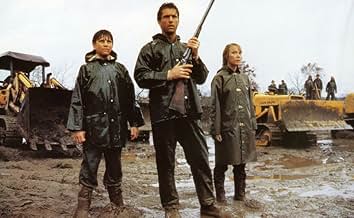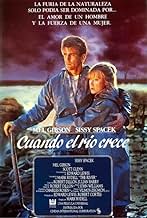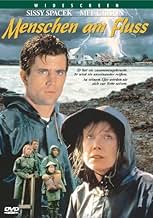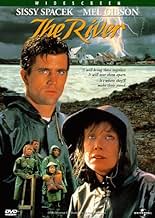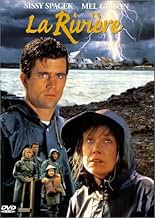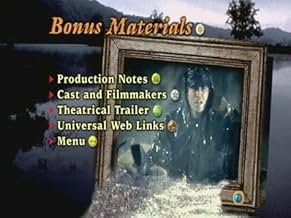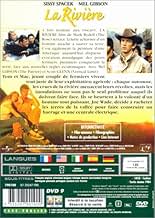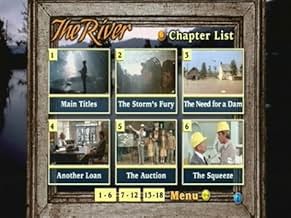CALIFICACIÓN DE IMDb
6.3/10
8.2 k
TU CALIFICACIÓN
Una familia de agricultores se enfrenta a serios problemas: un banco amenaza con quitarles su granja, mientras viven otros momentos difíciles para tratar de salvarla y conservarla.Una familia de agricultores se enfrenta a serios problemas: un banco amenaza con quitarles su granja, mientras viven otros momentos difíciles para tratar de salvarla y conservarla.Una familia de agricultores se enfrenta a serios problemas: un banco amenaza con quitarles su granja, mientras viven otros momentos difíciles para tratar de salvarla y conservarla.
- Nominado a 4 premios Óscar
- 2 premios ganados y 7 nominaciones en total
Frank Hoyt Taylor
- Zemke
- (as Frank Taylor)
Opiniones destacadas
Continuing my plan to watch every Mel Gibson movie in order, 8 come to his first American movie. 1984's The River.
Plot In A Paragraph: Tom and Mae Garvey (Gibson and Sissy Spceck) struggle to keep their farm from the bank, floods and from local financer Joe Wade (Scott Glenn) who wants to buy up all the land, dam a local river which floods and generate some new jobs.
The river was Gibson's first American movie, and he is fine, but is over shadowed by Spaceck and a strong supporting turn from Scott Glenn, who is effectively the movies villain, it is a funny movie as the "Bad Guy" is right all along and Gibson and Spaceck's characters should have listened to him!! He was talking good common sense!! And that's when you know it's a weird move!! If you are rooting for who is essentially the bad guy.
It's watchable, but that's about it.
The River grossed $11 million at the domestic box office to end the year the 72nd highest grossing movie of 1984.
Plot In A Paragraph: Tom and Mae Garvey (Gibson and Sissy Spceck) struggle to keep their farm from the bank, floods and from local financer Joe Wade (Scott Glenn) who wants to buy up all the land, dam a local river which floods and generate some new jobs.
The river was Gibson's first American movie, and he is fine, but is over shadowed by Spaceck and a strong supporting turn from Scott Glenn, who is effectively the movies villain, it is a funny movie as the "Bad Guy" is right all along and Gibson and Spaceck's characters should have listened to him!! He was talking good common sense!! And that's when you know it's a weird move!! If you are rooting for who is essentially the bad guy.
It's watchable, but that's about it.
The River grossed $11 million at the domestic box office to end the year the 72nd highest grossing movie of 1984.
By 1984, Hollywood must have decided we had been in outer space too long with the Star Wars Trilogy. They decided to bring us not only back down to earth, but to take us down on the farm with The Green Acres trilogy. In the space of a year they gave us Places In The Heart, with Sally Field, Country with Jessica Lange, and this movie The River with Sissy Spacek and Mel Gibson.
Of the three this is the only one I saw in a theater, and if you're going to view this film, it is best viewed in a theater or on a big screen TV with the DVD. That's not to say you can't otherwise enjoy The River, but what you miss is some beautiful photography by Vilmos Zsigmond, that draws you in from the opening frame and will keep you enthralled throughout. From the opening shots of the grey clouding skies and the first drops of rain dropping gently off the leaves, to the mighty force of the torrential thunderstorm and the raging waters of the river, you are treated to a Cinematographer's delight. Not once, during the first fifteen twenty minutes of The River do you even consider the notion that there are guys out there with hoses spraying the set down, and if they were I sure don't want to know about it. Even after the opening storm has subsided, the film becomes almost like an oil painting of rural America.
Not only is the photography in The River impeccable, it has sound editing that matches it on every level. This sounds like a storm in every aspect, from the rain hitting the tin barn roof, the sound of the river water overflowing it's banks, to the sound Tom Garvey's (Mel Gibson) boots sloshing through the mud. Even the sound of Tom's tractor, as he is anxiously trying to keep the river from overflowing it's banks is meticulously detailed. This film was deservedly nominated for an Oscar for both cinematography and sound editing, and in my opinion, should have won both, having lost out to The Killing Fields and Amadeus, respectively. (It did win a special achievement award for sound effects so go figure!)
Then there's the musical score. One critic complained that John Williams academy award nominated score was a bit overdone, but I think what that particular critic didn't understand is that the musical score perfectly complimented the cinematography. It's beautifully done, and it's a shame that it is never mentioned in the huge lists of John William's film scores.
Okay, so what about the rest of the film? Tom Garvey, his wife Mae (Sissy Spacek in an academy award nominated performance, but lost to Sally Fields for the previously mentioned Places In The Heart) along with their two children Lewis and Beth (well played by Shane Bailey and Becky Jo Lynch), are trying desperately to hold on to their farm through tough times. It doesn't help matters that Tom's crop is washed out at the beginning of the film by a massive flood. Throw into this mix, Joe Wade (Scott Glenn), who wants to see the Garveys fail so that his own Leutz Corporation can buy the farm out so that a dam can be built, a dam that would flood the valley, taking Tom and Mae's farm with it. This is not only a film about a man trying to hold on, but it is also an essay on character, Tom's, Mae's, and Joe Wade's.
Just by listening, we find out that at one time, before Mae and Tom were married, there was something going on between her and Joe Wade, and that Joe ended up with someone else. We are never told much of the details, but we know that anything that Joe Wade does irritates Tom tremendously. There is a scene between Mae and Tom, after Joe has made Tom what seems to be a more than reasonable offer on the farm, he refuses to even discuss it. "Because it's from him?" Mae asks. It is Tom's hesitation before giving her a stock answer that gives him away. He says it is not, but Mae and the audience know otherwise. As you watch this film, it is the subtlety in the performances, that says more here than any of the dialogue which drops only subtle hints about what happened in the past. Joe is on Tom and Mae's minds, even when he's not around.
Though she never says anything to make us think so, we can tell that there are times when being a farmer's wife is beginning to wear on Mae. At one scene taking place at a farm auction, another woman tells her "I hate being a farmer's wife". From the look on Mae's face, at this particular moment in time, she is in agreement. When she is trying to figure out where the money is going to come from to pay Sears, when she can't call a vet when their cow is dying, you can tell Mae is being worn down. As Mae looks around her, when they are at the auction, and sees what is happening to not only herself, but to all the other farmers around her we know what she is thinking, though she hardly speaks.
Some have complained about Mel Gibson's Tom Garvey being too stubborn and unsympathetic. There is another scene at the auction when someone offers to help Tom unload his truck and Tom refuses the offer. Mae grabs the man by the arm and tells this guy that he knows how Tom is not to take it personally. "Yes, just like, his father" he answers. Towards the end of the film, when the River is about to flood once again, we see Tom treating his children more like work hands than anything else, and we can imagine that Tom was raised in much the same way, so though we may not like his stubbornness, we now at least understand why he's that way. If Gibson's performance weren't consistent throughout, then the whole characterization wouldn't have worked.
There are some minor flaws in the film. Most of the things that happen when Tom takes a job as a scab at an iron works plant, are too loaded with heavy-handed symbolism, and unnecessarily so. The end of this film is also a bit of a disappointment. We may not like Joe Wade much, but we never feel any great animosity toward him at any time. The actions he takes in the waning moments, are way over the top in order to bring things to some type of dramatic close. It is not true to what the character had been up to that point, and it unnecessarily makes too much of a villain out of him. Besides, someone who runs a big corporation wouldn't take such actions, as it easily would open them up to a gigantic law suit.
Of the three farm movies that opened in a years time, I think this one is the most underrated and forgotten of the three. I've seen all of them, and though Sally Field's performance in Places in the Heart was good, I think Sissy Spacek's role here was much more difficult, as it required her to do so much in a very subtle way. Then again, I've never thought of the Academy Awards as being much of a judge of anything, let alone who was the best farmer!
Till Next Time, Next Class Please
Of the three this is the only one I saw in a theater, and if you're going to view this film, it is best viewed in a theater or on a big screen TV with the DVD. That's not to say you can't otherwise enjoy The River, but what you miss is some beautiful photography by Vilmos Zsigmond, that draws you in from the opening frame and will keep you enthralled throughout. From the opening shots of the grey clouding skies and the first drops of rain dropping gently off the leaves, to the mighty force of the torrential thunderstorm and the raging waters of the river, you are treated to a Cinematographer's delight. Not once, during the first fifteen twenty minutes of The River do you even consider the notion that there are guys out there with hoses spraying the set down, and if they were I sure don't want to know about it. Even after the opening storm has subsided, the film becomes almost like an oil painting of rural America.
Not only is the photography in The River impeccable, it has sound editing that matches it on every level. This sounds like a storm in every aspect, from the rain hitting the tin barn roof, the sound of the river water overflowing it's banks, to the sound Tom Garvey's (Mel Gibson) boots sloshing through the mud. Even the sound of Tom's tractor, as he is anxiously trying to keep the river from overflowing it's banks is meticulously detailed. This film was deservedly nominated for an Oscar for both cinematography and sound editing, and in my opinion, should have won both, having lost out to The Killing Fields and Amadeus, respectively. (It did win a special achievement award for sound effects so go figure!)
Then there's the musical score. One critic complained that John Williams academy award nominated score was a bit overdone, but I think what that particular critic didn't understand is that the musical score perfectly complimented the cinematography. It's beautifully done, and it's a shame that it is never mentioned in the huge lists of John William's film scores.
Okay, so what about the rest of the film? Tom Garvey, his wife Mae (Sissy Spacek in an academy award nominated performance, but lost to Sally Fields for the previously mentioned Places In The Heart) along with their two children Lewis and Beth (well played by Shane Bailey and Becky Jo Lynch), are trying desperately to hold on to their farm through tough times. It doesn't help matters that Tom's crop is washed out at the beginning of the film by a massive flood. Throw into this mix, Joe Wade (Scott Glenn), who wants to see the Garveys fail so that his own Leutz Corporation can buy the farm out so that a dam can be built, a dam that would flood the valley, taking Tom and Mae's farm with it. This is not only a film about a man trying to hold on, but it is also an essay on character, Tom's, Mae's, and Joe Wade's.
Just by listening, we find out that at one time, before Mae and Tom were married, there was something going on between her and Joe Wade, and that Joe ended up with someone else. We are never told much of the details, but we know that anything that Joe Wade does irritates Tom tremendously. There is a scene between Mae and Tom, after Joe has made Tom what seems to be a more than reasonable offer on the farm, he refuses to even discuss it. "Because it's from him?" Mae asks. It is Tom's hesitation before giving her a stock answer that gives him away. He says it is not, but Mae and the audience know otherwise. As you watch this film, it is the subtlety in the performances, that says more here than any of the dialogue which drops only subtle hints about what happened in the past. Joe is on Tom and Mae's minds, even when he's not around.
Though she never says anything to make us think so, we can tell that there are times when being a farmer's wife is beginning to wear on Mae. At one scene taking place at a farm auction, another woman tells her "I hate being a farmer's wife". From the look on Mae's face, at this particular moment in time, she is in agreement. When she is trying to figure out where the money is going to come from to pay Sears, when she can't call a vet when their cow is dying, you can tell Mae is being worn down. As Mae looks around her, when they are at the auction, and sees what is happening to not only herself, but to all the other farmers around her we know what she is thinking, though she hardly speaks.
Some have complained about Mel Gibson's Tom Garvey being too stubborn and unsympathetic. There is another scene at the auction when someone offers to help Tom unload his truck and Tom refuses the offer. Mae grabs the man by the arm and tells this guy that he knows how Tom is not to take it personally. "Yes, just like, his father" he answers. Towards the end of the film, when the River is about to flood once again, we see Tom treating his children more like work hands than anything else, and we can imagine that Tom was raised in much the same way, so though we may not like his stubbornness, we now at least understand why he's that way. If Gibson's performance weren't consistent throughout, then the whole characterization wouldn't have worked.
There are some minor flaws in the film. Most of the things that happen when Tom takes a job as a scab at an iron works plant, are too loaded with heavy-handed symbolism, and unnecessarily so. The end of this film is also a bit of a disappointment. We may not like Joe Wade much, but we never feel any great animosity toward him at any time. The actions he takes in the waning moments, are way over the top in order to bring things to some type of dramatic close. It is not true to what the character had been up to that point, and it unnecessarily makes too much of a villain out of him. Besides, someone who runs a big corporation wouldn't take such actions, as it easily would open them up to a gigantic law suit.
Of the three farm movies that opened in a years time, I think this one is the most underrated and forgotten of the three. I've seen all of them, and though Sally Field's performance in Places in the Heart was good, I think Sissy Spacek's role here was much more difficult, as it required her to do so much in a very subtle way. Then again, I've never thought of the Academy Awards as being much of a judge of anything, let alone who was the best farmer!
Till Next Time, Next Class Please
I'll agree with most of the previous comments on The River, but will also add that the focus of the very last confrontational scene defines for us the essence of the film and brings forth in the heartless protagonist, Mr. Wade, what he had so humanly (inhumanely?) failed to render throughout the entire story -- respect for those he was trying to selfishly destroy. If you've ever watched just one lonely individual (Mel Gibson in this case) do only what he/she could do (grab a couple mud bags) to make a difference against overwhelming odds, then to be joined in the task by those who were too paralyzed to even think, you'll find similar and inspiring action here, yourself caught up in the grittiness it all takes, and you'll almost rise from your seat to help patch the breached water wall with them.
One man prevailed, an entire valley's worth of beaten-down folk rallied, and what machinery couldn't absolutely guarantee, slogging feet and wet, muddy hands secured.
You just have to love it.
One man prevailed, an entire valley's worth of beaten-down folk rallied, and what machinery couldn't absolutely guarantee, slogging feet and wet, muddy hands secured.
You just have to love it.
Tom and Mae Garvey (Mel Gibson, Sissy Spacek) are the owners of a small eastern Tennessee farm that has been in the Garvey family for generations. It is the early 1980s, when the staggering U.S. economy threatens the welfare of the American family farm. The Garveys' struggles are compounded by the fact that their property is in a flood plain, and by the enmity of Tom's rival Joe Wade (Scott Glenn), who is a wealthy and powerful foe. This is not lighthearted entertainment.
For me, the film's most powerful moments come when cash-strapped Tom has to leave the farm to find work elsewhere. He unknowingly becomes a scab in a factory where the regular labor force is on strike. At least there is a regular paycheck, but the contrast between the man-made hell of a iron foundry/steel mill and the natural beauty of the family farm is compelling, and you can see why the Garveys struggle to hold on to their agricultural way of life, however hard it is. The cinematography for this movie is way above average, a celebration of rural America.
Sissy Spacek delivers her usual fine performance. Mel Gibson is very good-- his Tennessee accent quite convincing. The two youngsters who play their children deserve special praise for their natural performances. This is a good, thoughtful movie-- not romantic, thrilling or exciting-- but one the family can watch together and think what sacrifices they would make to keep a heritage and a way of life preserved.
For me, the film's most powerful moments come when cash-strapped Tom has to leave the farm to find work elsewhere. He unknowingly becomes a scab in a factory where the regular labor force is on strike. At least there is a regular paycheck, but the contrast between the man-made hell of a iron foundry/steel mill and the natural beauty of the family farm is compelling, and you can see why the Garveys struggle to hold on to their agricultural way of life, however hard it is. The cinematography for this movie is way above average, a celebration of rural America.
Sissy Spacek delivers her usual fine performance. Mel Gibson is very good-- his Tennessee accent quite convincing. The two youngsters who play their children deserve special praise for their natural performances. This is a good, thoughtful movie-- not romantic, thrilling or exciting-- but one the family can watch together and think what sacrifices they would make to keep a heritage and a way of life preserved.
One of those Mel Gibson movies that no one has heard of and yet, is excellent. Sissy Spacek coming off of an Academy Award for Coal Miner's Daughter (1980) is excellent here too (nominated for this one as well).
It's always a tough go for farmers, but the 80's was particularly bad. Remember Farm Aid, 1985?
Scott Glen plays a good bad guy looking to push some farmers off their land. Mel and Sissy show that love is the tie that binds and resist giving up. Great cast and performances all around.
The River is really one of those lost gems from the 80's. The two main actors, Spacek and Gibson, show why their careers really took off during this time.
It's always a tough go for farmers, but the 80's was particularly bad. Remember Farm Aid, 1985?
Scott Glen plays a good bad guy looking to push some farmers off their land. Mel and Sissy show that love is the tie that binds and resist giving up. Great cast and performances all around.
The River is really one of those lost gems from the 80's. The two main actors, Spacek and Gibson, show why their careers really took off during this time.
¿Sabías que…?
- TriviaMark Rydell has said of this film: "Río violento (1984) is a tribute to a vanishing America - - the America of the independent farm family. The Garvey family represents the lifestyle that made America work: continuity of generations, the passing on of traditions, and of knowledge and skills, from fathers to sons, from mothers to daughters - a way of life in which every member of the family is unique and necessary for the survival of all."
- ErroresThroughout the movie, the weather seems to go from hot to very cold. In the beginning scenes you see the Garveys out trying to shore up the levee on there land and you can see their breath. In another seen, Lewis is walking behind his fathers tractor (planting seeds and the tractor over heats scene) in what looks like a hot summer afternoon. Same with the scenes wear Tom goes to the steel mill for work and it's very cold out while back at the farm, Mrs Garvey is sweating on the tractor while spraying the corn.
- Versiones alternativasThe BBFC cut the original UK cinema release by 10 seconds. Later home video releases were upgraded to 15 and passed with the cuts restored.
- Bandas sonorasThe Fireman
Written by Mack Vickery and Wayne Kemp
Performed by George Strait
Courtesy of MCA Recordings, Inc.
Selecciones populares
Inicia sesión para calificar y agrega a la lista de videos para obtener recomendaciones personalizadas
- How long is The River?Con tecnología de Alexa
Detalles
Taquilla
- Presupuesto
- USD 18,000,000 (estimado)
- Total en EE. UU. y Canadá
- USD 11,489,982
- Fin de semana de estreno en EE. UU. y Canadá
- USD 30,027
- 25 dic 1984
- Total a nivel mundial
- USD 11,489,982
- Tiempo de ejecución2 horas 4 minutos
- Color
- Mezcla de sonido
- Relación de aspecto
- 1.85 : 1
Contribuir a esta página
Sugiere una edición o agrega el contenido que falta

Principales brechas de datos
By what name was Río violento (1984) officially released in India in English?
Responda

